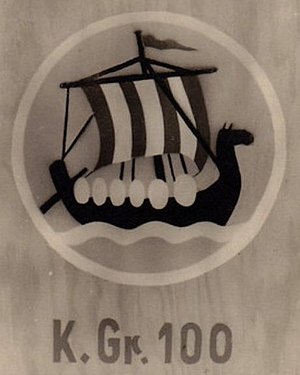Kampfgruppe 100
| Combat Group 100 | |
|---|---|
| Kampfgruppe 100 | |
 | |
| Country | |
| Branch | Template:Luftwaffe |
Kampfgruppe 100 (KGr 100) was a specialist unit of the Luftwaffe during the early stages of World War II. It is best known as the first unit to use the "pathfinder" concept, with its aircraft being equipped with the latest radio navigation aids to find their targets and then dropping flares on them to mark the target for the following bombers.
The unit first formed out of parts of Luftnachrichten Abteilung 100 at Köthen on 18 November 1939 with a HQ unit and two squadrons, 1./ and 2./KGr 100. In keeping with typical Luftwaffe organization, Kampfgruppe 100 was later expanded to three squadrons, all flying the Heinkel He 111H.
On 15 December 1941 the unit was used as the basis for the greatly expanded Kampfgeschwader 100, becoming I.Gruppe/KG 100.[1]
The distinguishing alphanumeric Geschwaderkennung code for both KGr 100 and its later wing-sized successor unit was 6N.
References
- ^ Michael Holm, "Kampfgruppe 100"
- Balke, Ulf. "Kampfgeschwader 100 "Wiking" : eine Geschichte aus Kriegstagebüchern, Dokumenten und Berichten : 1934-1945", Motorbuch Verlag, 1981
- de Zeng, H.L; Stankey, D.G; Creek, E.J. Bomber Units of the Luftwaffe 1933-1945; A Reference Source, Volume 1. Ian Allan Publishing, 2007. ISBN 978-1-85780-279-5
- Goss, Chris. (2000). The Luftwaffe Bombers' Battle of Britain. Crecy, Manchester. ISBN 0-947554-82-3
- Goss, Chris. (2010). The Luftwaffe's Blitz: The Inside Story, November 1940—May 1941. Crecy, Manchester. ISBN 978-0-85979-148-9
- Hooton, E.R. (1994). Phoenix Triumphant: The Rise and Rise of the Luftwaffe. Arms & Armour, ISBN 1854091816.
- James, T.C.G and Cox, Sebastian. The Battle of Britain. Frank Cass, London. 2000. ISBN 978-0-7146-8149-8
- Wakefield, Ken (1999). Pfadfinder: Luftwaffe Pathfinder Operations Over Britain. NPI Media Group. ISBN 978-0-75241-692-2
